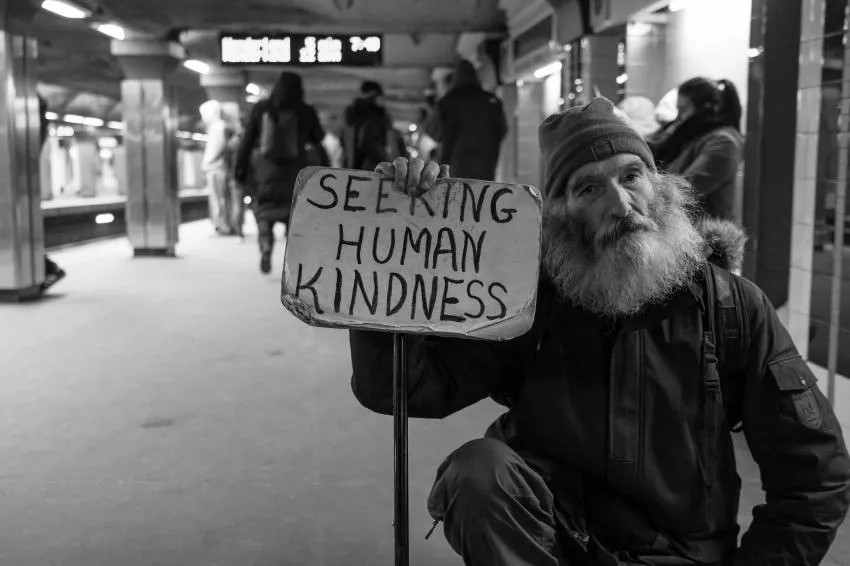The Power Of Giving

For me, there is nothing more beautiful than watching the first snowfall, while sipping a minty hot chocolate on the corner of the fireplace. I'm the kind of person who gets enthusiastic to see Christmas lights around the city and hearing "Joy to the world" over and over again.
But what makes the holidays really special, is the spirit of spending time with our loved ones and sharing what we can with the less fortunate than us. I believe Christmas is more than finding the perfect gift for the right person. It's about making those little acts of kindness that make us grateful.
Speaking of gifts, a lot of us are worried about the cost of them, especially in the uncertain time we are living in, with the pandemic's impact on the economy. The good news is, a gift doesn't need to cost anything! Often, the most meaningful presents are not made of silver and gold, but of quality time.
There are so many ways to give to others! We all know the conventional ways of offering presents or giving money to charity, but there's also sharing your knowledge by teaching, making the gift of time and energy by volunteering, or just giving support and encouragement to someone in doubt.
Have you ever noticed the spark in someone's eyes when you compliment and smile at them?
Researches conducted by the National Institutes of Health have found that the happiness linked with the act of giving lasts longer than the one experimented while receiving. While looking at the magnetic resonance imaging (MRI), researchers have noticed that the brain of people who gave to various charities reacts in a similar way than when receiving money or eating dessert.
The happiness linked with the act of giving is called the "helper's high" and is provoked by the release of endorphins in the mesolimbic pathway, which is the reward center in the brain, associated with pleasure. Other chemicals such as serotonin, dopamine, and oxytocin are also produced in your body when genuinely giving or helping.
If you are a jogger, you probably experienced the feeling of renewed energy after the first few miles. The concept is the same here. The well-being makes you want to go again the next day.
Considering these chemicals as highly addictive, researchers at the University of California have theorized that this physical feature is part of our quest to survive and thrive.
Because of our very vulnerable offspring, the fundamental task for human survival and gene replication is to take care of others. Human beings have survived as a species because we have evolved the capacities to care for those in need and to cooperate. — Dacher Keltner, co-director of UC Berkeley's Greater Good Science Center

The Alcoholics Anonymous program uses this concept by making seniors collaborate with new recruits to guide them through the path of sobriety. It has been shown that when sharing a similar experience and having a purpose helps also the senior to stay away from alcohol. They result in being less depressed, because honestly, who can be depressed knowing they might have saved a life?
How amazing is it to know that helping is actually healing the wounded healer?
Not only people fighting bad habits can benefit from helping, but people with anxiety, for example, or with physical pain will dramatically change their lives by doing so. Some studies even linked participating in charity events with living longer!
No-one has ever become poor by giving. — Anne Frank
I think that for many of us, Christmas is less a religious holiday than a cultural event. I know a lot of none Christian that still enjoy decorating their living room with a Christmas tree or watching every Christmas movie on Netflix.
Moreover, all religions have the same conception of compassion and generosity. For example, monks in Buddhism have to let go of any possession and are thought to be humble. For them, the donor's motive is more important than the action itself. You should never feel pressured to give, but do it with altruism. Perhaps we wouldn't talk about overconsumption if everybody would follow this principle during the holidays...
Although we all know Ramadan, in Islam, as a month of fasting from the sunrise to the sunset, this celebration includes more virtues than privation. It's about putting ourselves in people in need's shoes, to remind us to always give with empathize. Just like the holiday season, it's a time of forgiving others, keeping in touch with loved ones, fighting bad behaviors, and giving back. Yet, not all gifts equal another. They promote the gifts that keep on giving long after you.
For example, teaching someone how to fish will feed him for longer than giving him one fish or planting a tree will provide shelter and food for years to come.
With all this said, no surprise that there are so many philanthropic organizations world wild!
Opinions and Perspectives
This article really resonates with me. I've always found more joy in giving than receiving, and it's fascinating to learn there's actual science behind that feeling!
The part about the 'helper's high' is so interesting. I never knew our brains react similarly to giving as they do to eating dessert.
While I agree giving is important, I think the article romanticizes it a bit too much. Some people simply can't afford to give, especially during these tough economic times.
I appreciate how the article connects different religious and cultural perspectives on giving. It shows how universal this concept really is.
Those MRI findings are incredible! It makes so much sense why volunteering always leaves me feeling energized.
Anyone else find it interesting how the AA program uses this principle? What a brilliant way to help both the mentor and mentee.
The Anne Frank quote hits hard. Such wisdom from someone so young.
I love the comparison between giving and jogging. That runner's high feeling is exactly what I get after volunteering at our local shelter.
The article makes some good points, but let's be real. Not all giving is purely altruistic. Sometimes people give just to look good.
True about Christmas becoming more cultural than religious. I'm not Christian but still love the giving spirit of the season.
The Buddhist perspective on giving with pure motives really made me think. Maybe we should all examine our giving intentions more closely.
Interesting point about teaching someone to fish versus giving them fish. Really makes you think about sustainable giving.
I've personally experienced that helper's high they mention. Last week I helped an elderly neighbor with groceries and felt amazing all day.
The science behind giving is fascinating, but I wish they'd included more specific research studies.
Completely agree with the part about gifts not needing to cost money. Some of my most treasured gifts were just someone's time.
That's such a good point about Christmas lights and holiday music! It really does create such a magical atmosphere.
The link between giving and survival as a species is mind-blowing. Never thought about it that way before.
I work with charity organizations and can confirm that regular givers are often the most positive people I know.
The part about Ramadan really opened my eyes. Never knew it was about more than just fasting.
Quality time as a gift is underrated. My kids remember experiences way more than material presents.
Those brain chemicals sound amazing. Who knew being nice could be scientifically proven to be addictive?
The pandemic really showed us how important giving can be. Remember all those people helping their neighbors?
I actually disagree about gift-giving during Christmas. It's become too commercialized and puts pressure on people.
Love the mention of compliments and smiles as forms of giving. Those small gestures can really change someone's day.
The research about giving leading to a longer life is fascinating. Would love to see more studies on that.
Interesting how they connected ancient survival instincts to modern giving behaviors.
The concept of wounded healers helping themselves by helping others is powerful stuff.
My grandmother always said giving was the secret to happiness. Nice to see science proving her right!
This reminds me of when I started volunteering at the food bank. Changed my whole perspective on giving.


